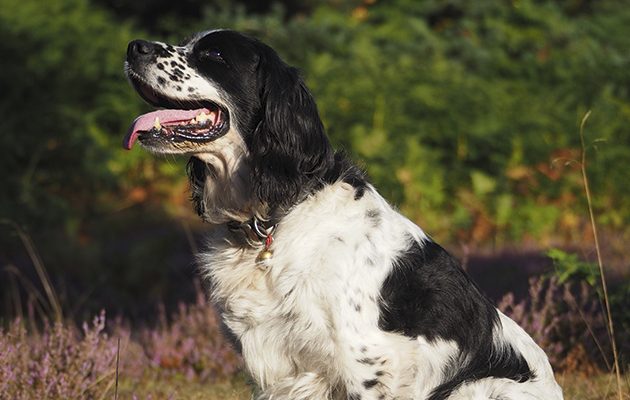It is always sad to lose an old shooting companion, says David Tomlinson, but important to know when the time has come to let them go
Losing an old friend and dealing with gundog bereavement is always sad and painful. But it is important to know when to let them go, says David Tomlinson.
Read our tips on giving your gundog a happy retirement, read gundog retirement: looking after an old dog.
GUNDOG BEREAVEMENT
I was leaning on a gate, watching the foxhounds, when I fell into conversation with a fellow follower. She noted that I was accompanied by just one black-and-white spaniel, not the usual two, so I explained that Fleur, my senior springer, had died a couple of weeks before. Ironically, my companion’s labrador had died in the same week and at almost the same age – Fleur was 15 years and two months, her dog was a month older. We both agreed that it was a great age to get a dog to but that losing such an old friend is still painful. “I’ve never seen my husband cry so much,” she told me.
It’s a curious fact that few things in life hurt more than losing a much-loved dog but gundog bereavement is something that only a fellow dog owner can appreciate. Fleur had been with me for nearly a quarter of my lifetime and in that time we had shared many great days together. Her career had been as a picking-up dog. Not for her collecting the easy birds around the pegs: no, she would much rather be hunting the wing-tipped bird that fell two fields away and she would be deaf to the whistle until she found it. She stopped working at the age of 12, going on to enjoy a long and happy retirement.
If you do an internet search of the words gundog bereavement you will come up with 528,000 results, a reminder of just how much the death of a dog affects us. I was touched by the words of Roy Hattersley, writing about the death of his 15-year-old dog, Buster. “I sat in the first floor room in which I work, watching my neighbours go about their lives, amazed and furious that they were behaving as if it was a normal day,” wrote Hattersley. “Stop all the clocks. Buster was dead.”
You won’t be surprised to hear that there are gundog bereavement services. Non-dog owners may give a superior smile at the thought but there’s a need for them. The Blue Cross, for example, has a freephone helpline, the charity’s declared mission to provide free and confidential emotional support to anyone who is affected by the loss of a pet.
In many ways, we are kinder to dogs than we are to humans, for we can decide when the quality of our dog’s life has declined to the point where it is kinder to have it put down. However, any vet will tell you that many people keep their dogs alive for far longer than they should, though choosing the right moment to call the vet is extraordinarily difficult. I have always worked on the three Ws rule. If a dog still wags its tail, wants to go for walks and wolfs its food down, it is still enjoying life. Fleur did all three until her last day, when she decided she had had enough.
I’ve always admired those shooting people who can put their own dog down, taking the animal out for its last walk with the gun, but that’s not something I could do. It’s easier, of course, if the dog is simply a worker and not a pet, as there’s not the same emotional attachment. But for most of us our working gundogs are also our family companions. I remember once talking to a professional huntsman about putting down the old hounds that could no longer keep up with the pack. He admitted to me that he couldn’t do it, so had to rely on his whipper-in to do it for him.
Perhaps the worst aspect of losing a dog is the emptiness it leaves behind. It’s not just the empty bed, the unused lead or the lack of muddy paw prints on the kitchen floor, it’s the fact that there’s no longer any need for that pre-breakfast walk, enjoyed or endured whatever the weather. The blow of gundog bereavement is softened if you have more than one dog, as I have always done. Though many people have told me how their surviving dog apparently misses its companion, my spaniels have never seemed too bothered, just moving up one in the pecking order.
When I lost my first springer, many years ago, a friend sent me the following poem. It may have brought a tear to the eye but it certainly helped.
If it should be that I grow weak
and pain should keep me from my sleep.
Then you must do what must be done,
for this last battle cannot be won.
You will be sad, I understand.
Don’t let your grief then stay your hand.
For this day more than all the rest,
your love for me must stand the test.
We’ve had so many happy years,
what is to come can hold no fears.
You’d not want me to suffer so.
The time has come, please let me go.
Take me where my needs they’ll tend
and please stay with me until the end.
Hold me firm and speak to me,
until my eyes no longer see.
I know in time that you will see,
the kindness that you did for me.
Although my tail its last has waved,
from pain and suffering I’ve been saved.
Please do not grieve it must be you
who had this painful thing to do.
We’ve been so close, we two, these years.
Don’t let your heart hold back its tears.





